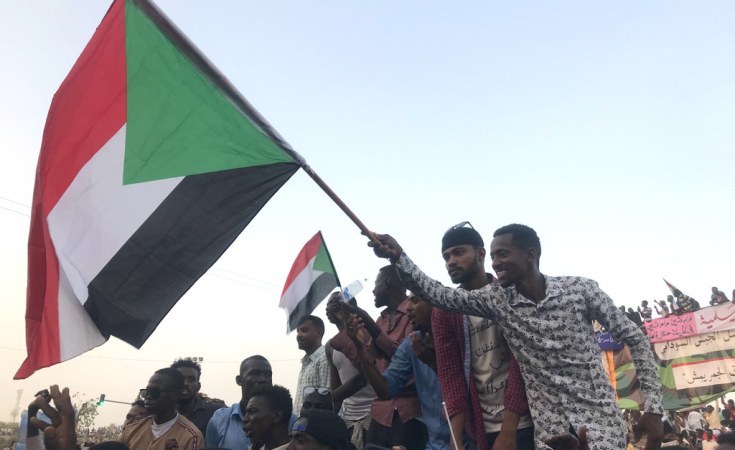Khartoum — While the mainstream Forces for Freedom and Change-Central Council reported a breakthrough on reform of the country's military and security institutions, the FFC-Democratic Block allegedly agreed to a proposal of the AU-IGAD-UN Trilateral Mechanism about the percentage of power-sharing for rebel movements during the upcoming transitional period. A group of non-signatories of the Framework Agreement met on Monday to discuss the important of forming "a united revolutionary front in order to overthrow the military junta".
Shehab Ibrahim, spokesperson for the FFC-CC, told Radio Dabanga following "a crucial meeting" between the civilian and military signatories of the Framework Agreement on Wednesday that they discussed new possible dates for the signing of the Final Agreement.
He further reported an "important breakthrough" in the discussions of the Technical Committee on Security and Military Reform on the issues of integration, reform and modernisation of the army, Rapid Support Forces militia, and the security services.
On Saturday, the signatories of the Framework Agreement decided to postpone the signing of the Final Agreement to April 6 instead of April 1, as originally planned, to give the ruling junta extra days to resolve internal differences over military reform.
Many did not expect the Final Agreement to be signed today. Moreover, many Sudanese activists, lawyers, and analysts doubt about the possibility of civilian rule in Sudan, Mat Nashed wrote in his analysis posted in The New Arab yesterday. They say that "powerful security forces are determined to maintain de-factor control over the state for fear of losing their wealth, impunity, and support from foreign patrons".
Power-sharing
Meanwhile, well-informed sources told Radio Dabanga yesterday that the members of the FFC-DB alliance* agreed to a proposal of the AU-IGAD-UN Trilateral Mechanism about preserving the percentage of power-sharing for rebel movements as stipulated in the Juba Peace Agreement (JPA) during the upcoming transitional period.
The sources said that the Democratic Block demanded an amendment of the power-sharing deal to 47 per cent to include the members of the alliance that are no part of the JPA, including the National Movement Forces coalition chaired by former Darfur leader El Tijani Sese. Other sources reported that the alliance demanded a power-sharing for 38 per cent.
The members of the FFC-DB did not join the Framework Agreement, signed by the military junta and more than 40 political parties and civil society groups under the umbrella of the FFC-CC on December 5 last year, to pave the way for a Final Agreement, after which a new transitional civilian government will be formed. The FFC-CC so far refused to "flood the political process" with parties "that are not interested in democracy", such as the FFC-DB.
However, Radio Dabanga received reports about an rapprochement. The official spokesperson for FFC-DB, Juma El Wakeel, said yesterday that meetings with the FFC-CC are taking place "in order to find a comprehensive political solution that enhances the unity, stability and safety of the country".
The FFC-CC coalition "now opts for a dialogue after it reached a dead end," he said. "Sudan is now close to collapse. Everyone must resort to dialogue and lead the country out of the state of fragmentation."
The spokesperson further noted that the Trilateral Mechanism brokering the negotiations between the military and the civilian opposition "has become more serious as a facilitator". He called on the facilitators, "whether trilateral [AU-IGAD-UN] or quadruple [USA, UK, UAE, and Saudi Arabia], to remain neutral".
As for the upcoming civilian government, El Wakeel urged the National Umma Party "to play a positive role at this stage, as the FFC-CC includes parties that have no experience in ruling the country, not even on a personal level".
Thirteen political and civil entities and personalities agreed on the necessity of uniting the forces of the December Revolution in order to overthrow the coup.
Revolutionary forces
Representatives of other groups which did not sign the Framework Agreement or withdrew from the FFC-CC alliances, such as the Socialist Arab Ba'ath Party, the Sudan Liberation Movement under the leadership of Abdelwahid El Nur, the Darfur Bar Association, as well as prominent politicians like Ibrahim El Amin, former co-vice-president of the National Umma Party, met in Khartoum on Monday to discuss the current political situation.
We agreed on "the need for the unity of all the forces of the revolution under the umbrella of one broad grouping or front to work together to overthrow the junta," Ibrahim El Amin explained to Radio Dabanga on Wednesday. "The meeting aimed to unite the forces of the revolution. [..] We do not intend to form an new alliance or party, but it is rather an attempt to mobilise the political forces to protect the revolution."
Siddig Tawir, prominent member of the Socialist Arab Ba'ath Party and member of the Sovereignty Council during the government of PM Abdallah Hamdok (2019-2021), said that the joint statement of the 13 revolutionary groups and politicians following their meeting on Monday, "is the result of meetings that started months ago". He considers the statement "a first step towards building a broad popular front for all the forces of the revolution".
The statement called "on all forces and organisations of the revolution inside and outside the country to communicate and engage themselves by presenting their delegates and their ideas".
* The Democratic Block was formed by the Justice and Equality Movement (JEM) led by Jibril Ibrahim, currently Minister of Finance, the Sudan Liberation Movement spit-off faction headed by Minni Minawi, now Governor of the Darfur Region, the Democratic Justice Alliance headed by Mubarak Ardol, director of the Sudanese Mineral Resources Company, and the mainstream Democratic Unionist Party in early November last year. The alliance also includes the Republican Party, the Beja Nazirs Council wing chaired by Sayed Tirik, and the National Movement Forces coalition formed by former Darfur leader El Tijani Sese, and groups that split-off from a number of political parties.


